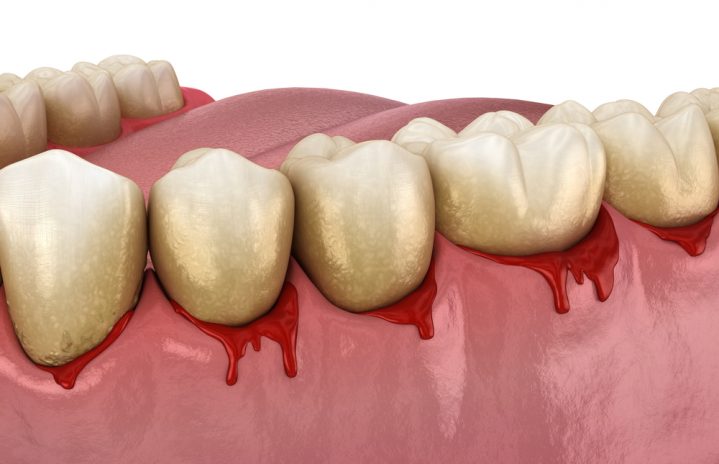It is not uncommon for people to notice some drops of blood in the sink after some careful flossing. You may dismiss it as a simple injury, perhaps due to aggressive flossing or brushing, but proper dental care should never cause your gums to bleed. It is just not normal, and is actually an indicator for gum disease caused by poor oral hygiene that allows bacteria and plaque to buildup. While aggressive flossing and brushing may cause bloody gums, below are other more likely triggers to look into.
- Gingivitis
This is the first stage of gum disease, characterized by swollen, tender and bleeding gums. It occurs when your gums get infected by plaque buildup at the gumline. Proper brushing and flossing combined with regular dental checkups can sufficiently manage gingivitis.
- Periodontal Disease
If gingivitis is not controlled early and is allowed to worsen, it leads to red and swollen gums, more bleeding gums, gum recession, loose teeth, and persistent bad taste and bad breath, all of which indicate periodontal disease. This problem can be corrected, but can be costly, as you need your dentist to perform deep cleaning for bacteria and plaque to be removed from beneath the gum line.
- Hormonal Conditions
Hormonal fluctuations, especially among pregnant women, increase their risk for gum disease as the body begins to respond differently to the bacteria. Regular brushing and flossing, combined with more frequent dental checkups, can help prevent this. Other situations such as puberty and menopause can also cause increased blood circulation and gum sensitivity, leading to bleeding gums. Consider switching to a softer toothbrush to avoid injuring your gums.
- Medications
Blood thinning medications are claimed to be one of the likely causes of bleeding gums. Such medications reduce the ability of blood to clot, making it easier to bleed. If it becomes a major concern, you should talk to your doctor and dentist to find a solution.
- Changes in Your Regular Dental Care
This could be anything from changing to a new, harder toothbrush to a new flossing routine. When changing your toothbrush, stick to a soft bristled one or ask your dentist to recommend a suitable one for you—even an electric toothbrush. Flossing can also cause bleeding if you skip a few days before flossing, or floss your teeth too often. Try flossing once a day to reduce the risk of injury and allow the gums to heal themselves.
There are other factors that can cause bleeding gums, including vitamin deficiencies, idiopathic thrombocytopenic purpura, and leukemia. If you experience gum sensitivity or bleeding gums, visit your dentist for proper diagnosis and treatment recommendations.

